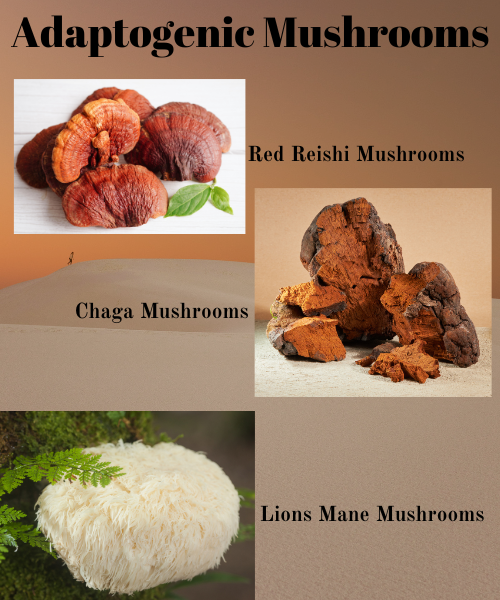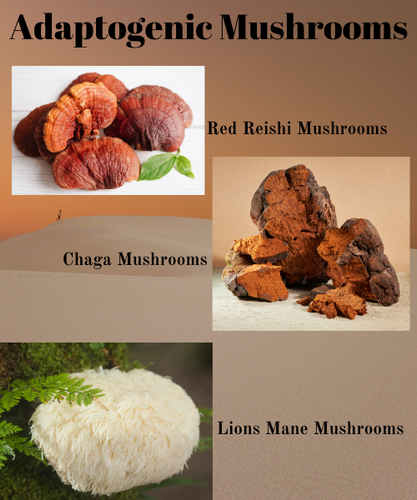Discover the Ancient Secrets of Adaptogenic Mushrooms and Their Modern-Day Benefits
Jan 16th 2025
Discover the Ancient Secrets of Adaptogenic Mushrooms and Their Modern-Day Benefits

The use of mushrooms for medicinal purposes dates back thousands of years, with various cultures recognizing their potential to enhance health and well-being. Ancient Chinese texts, some of which are over 2,000 years old, document the use of mushrooms like reishi (Ganoderma lucidum) and cordyceps (Cordyceps sinensis) for their purported health benefits. These mushrooms were often reserved for royalty and were believed to promote longevity, vitality, and spiritual enlightenment.
Similarly, in traditional Ayurvedic medicine, certain fungi were utilized to balance the body's energies and improve overall health. In addition to their historical significance in Asia, adaptogenic mushrooms have also played a role in indigenous cultures around the world. Native American tribes, for instance, utilized various fungi for their healing properties, often incorporating them into rituals and traditional medicine.
The wisdom of these ancient practices has been passed down through generations, leading to a resurgence of interest in adaptogenic mushrooms in contemporary wellness circles. This historical context highlights not only the longevity of these practices but also the deep-rooted belief in the power of nature to heal and restore balance.
Main Points
- Adaptogenic mushrooms have been used for centuries in traditional medicine for their ability to help the body adapt to stress and promote overall well-being.
- Modern research has shown that adaptogenic mushrooms can support the body's response to stress, boost immunity, and improve energy levels.
- Adaptogenic mushrooms can be incorporated into daily routines through supplements, teas, or adding them to meals for their health benefits.
- There are various types of medicinal mushrooms, each with its own unique properties and potential health benefits.
- Incorporating adaptogenic mushrooms into your daily routine can support overall well-being and help manage stress.
Exploring the Modern-Day Uses of Adaptogenic Mushrooms
Stress Management and Cognitive Function
One of the most notable modern applications of adaptogenic mushrooms is in the realm of stress management. As society becomes increasingly aware of the detrimental effects of chronic stress on health, many individuals are turning to these natural remedies as a means of support. For example, lion's mane (Hericium erinaceus) is celebrated for its potential neuroprotective properties and ability to enhance cognitive function, making it a popular choice for those looking to improve focus and mental resilience.
A Shift Towards Holistic Approaches
This shift towards incorporating ancient wisdom into contemporary health practices underscores a broader trend of seeking holistic approaches to well-being. As people become more aware of the interconnectedness of physical, mental, and emotional health, they are turning to natural remedies like adaptogenic mushrooms to promote overall wellness.
The Future of Wellness
As research continues to uncover the potential benefits of adaptogenic mushrooms, it is likely that their popularity will continue to grow. With their natural, holistic approach to health, these fungi are poised to play a significant role in the future of wellness.
Harnessing the Power of Adaptogenic Mushrooms for Stress Relief
Adaptogenic Mushrooms are particularly renowned for their ability to help the body adapt to stressors and maintain homeostasis. This unique characteristic is attributed to their influence on the hypothalamic-pituitary-adrenal (HPA) axis, which plays a crucial role in regulating the body's response to stress. By modulating this system, adaptogenic mushrooms can help reduce cortisol levels—often referred to as the "stress hormone"—thereby promoting a sense of calm and balance.
For instance, reishi mushrooms are often dubbed the "mushroom of immortality" due to their long history of use in traditional medicine. They are believed to possess calming properties that can alleviate anxiety and improve sleep quality. Many individuals incorporate reishi into their evening routines as a natural way to unwind after a hectic day.
Similarly, cordyceps are known for their energizing effects, making them an excellent choice for those seeking to combat fatigue while managing stress. By understanding how these mushrooms work synergistically with the body, individuals can harness their power effectively for stress relief.

The Science Behind Adaptogenic Mushrooms and Their Health Benefits
| Adaptogenic Mushroom | Health Benefits |
|---|---|
| Reishi | Supports immune system, reduces stress, and promotes better sleep |
| Cordyceps | Improves athletic performance, boosts energy, and supports respiratory health |
| Lion's Mane | Enhances cognitive function, supports brain health, and may reduce symptoms of anxiety and depression |
| Chaga | Rich in antioxidants, supports immune system, and may have anti-inflammatory properties |
The scientific exploration of adaptogenic mushrooms has revealed a wealth of bioactive compounds that contribute to their health benefits. Polysaccharides, triterpenes, and ergosterols are among the key constituents that have been studied for their immunomodulatory and anti-inflammatory properties. Research indicates that these compounds can enhance immune function by stimulating the activity of immune cells, thereby providing a protective effect against various diseases.
Moreover, studies have shown that certain adaptogenic mushrooms can positively influence mental health by promoting neurogenesis—the process by which new neurons are formed in the brain. Lion's mane mushroom, in particular, has garnered attention for its potential to stimulate nerve growth factor (NGF) production, which is essential for maintaining healthy neurons. This scientific backing not only validates traditional uses but also opens new avenues for therapeutic applications in mental health and cognitive enhancement.
Incorporating Adaptogenic Mushrooms into Your Daily Routine
Integrating adaptogenic mushrooms into daily life can be both simple and enjoyable. One popular method is through the use of powdered forms that can be easily added to smoothies, coffee, or herbal teas. For example, adding a teaspoon of lion's mane powder to your morning smoothie can provide a cognitive boost that enhances focus throughout the day.
Alternatively, reishi powder can be blended into warm milk or hot chocolate for a soothing evening drink that promotes relaxation. Capsules and tinctures are also convenient options for those who prefer a more straightforward approach. These forms allow for precise dosing without the need for preparation or cooking.
As with any supplement, it is essential to consult with a healthcare professional before incorporating adaptogenic mushrooms into your routine, especially if you have underlying health conditions or are taking medications. By finding the right method that suits individual preferences and lifestyles, one can effectively reap the benefits of these ancient fungi.
Understanding the Different Types of Medicinal Mushrooms
The world of medicinal mushrooms is vast and diverse, with each type offering unique benefits and properties. Some of the most well-known adaptogenic mushrooms include reishi, lion's mane, cordyceps, chaga (Inonotus obliquus), and turkey tail (Trametes versicolor). Reishi is often celebrated for its calming effects and immune-boosting properties, while lion's mane is recognized for its cognitive-enhancing abilities.
Cordyceps is particularly valued among athletes for its potential to improve physical performance and endurance by increasing oxygen utilization in the body. Chaga is rich in antioxidants and is often used for its anti-inflammatory properties, making it a popular choice for overall wellness support. Turkey tail is renowned for its immune-modulating effects and is frequently studied for its potential role in cancer support therapies.
Understanding these different types allows individuals to select the most suitable mushroom based on their specific health goals.
How Adaptogenic Mushrooms Can Support Overall Well-being
The holistic benefits of adaptogenic mushrooms extend beyond stress relief and cognitive enhancement; they also play a significant role in supporting overall well-being. By promoting balance within the body’s systems, these mushrooms can contribute to improved physical health as well as emotional resilience. For instance, many adaptogenic mushrooms possess antioxidant properties that help combat oxidative stress—a key factor in aging and chronic disease development.
Furthermore, regular consumption of adaptogenic mushrooms may enhance gut health due to their prebiotic fibers that nourish beneficial gut bacteria. A healthy gut microbiome is crucial for optimal digestion and immune function, underscoring the interconnectedness of physical health and mental well-being. As more individuals seek natural ways to support their health journeys, adaptogenic mushrooms offer a promising avenue for achieving holistic wellness through ancient wisdom backed by modern science.
FAQs
What are adaptogenic mushrooms?
Adaptogenic mushrooms are a group of fungi that have been used for centuries in traditional medicine systems, such as Traditional Chinese Medicine and Ayurveda, for their ability to help the body adapt to stress and promote overall well-being.
What is the history of adaptogenic mushrooms?
The use of adaptogenic mushrooms dates back thousands of years, with historical records showing their use in ancient cultures such as China, Japan, and Russia. They were traditionally used to promote longevity, boost energy, and support the body's natural resistance to stress.
What are the modern-day benefits of adaptogenic mushrooms?
In modern times, adaptogenic mushrooms are valued for their ability to support the body's response to stress, promote mental clarity, enhance immune function, and support overall well-being. They are also used to support energy levels and promote a healthy response to inflammation.
How do adaptogenic mushrooms help with stress relief?
Adaptogenic mushrooms contain bioactive compounds that help the body adapt to stress by regulating the production of stress hormones such as cortisol. They can help promote a sense of calm and balance in the body, supporting the body's natural response to stress.
What is the science behind adaptogenic mushrooms and their health benefits?
Adaptogenic mushrooms contain a variety of bioactive compounds, including polysaccharides, triterpenes, and antioxidants, which have been studied for their potential health benefits. Research suggests that these compounds may help support immune function, reduce inflammation, and promote overall well-being.
How can adaptogenic mushrooms be incorporated into a daily routine?
Adaptogenic mushrooms can be consumed in various forms, including as supplements, teas, tinctures, and powders. They can be added to smoothies, soups, or taken as a daily supplement to support overall health and well-being.
What are the different types of medicinal mushrooms?
Some common types of adaptogenic mushrooms include reishi, chaga, cordyceps, lion's mane, and shiitake. Each type of mushroom has its own unique set of health benefits, ranging from immune support to cognitive function and energy enhancement.
How can adaptogenic mushrooms support overall well-being?
Adaptogenic mushrooms can support overall well-being by helping the body adapt to stress, supporting immune function, promoting mental clarity, and enhancing energy levels. They can also help promote a healthy response to inflammation and support the body's natural healing processes.


